Essay on Sustainable Tourism and Industry in Canada: MGBBT1TEN
VerifiedAdded on 2023/06/08
|11
|2775
|352
Essay
AI Summary
This essay delves into the concept of sustainable tourism, defining its principles and application within the Canadian context. It explores the significance of sustainable practices in the tourism industry, aiming to minimize negative impacts and maximize positive ones. The essay outlines key principles for sustainable tourism development in Canada, such as resource management, waste reduction, biodiversity maintenance, and community involvement. It identifies the roles of various stakeholders, including national and local governments, tourism enterprises, tourists, and local communities, in the decision-making process. Furthermore, it analyzes the macro environmental factors, including political, economic, socio-cultural, technological, legal, and environmental aspects, and their influence on sustainable tourism development. The essay also examines the competitive micro-environment, highlighting suppliers, enterprises, marketing intermediaries, customers, and destination marketing organizations, and their impact on the demand for Canadian tourism products. The essay concludes by emphasizing the importance of sustainable tourism for the long-term health of the industry and the environment.
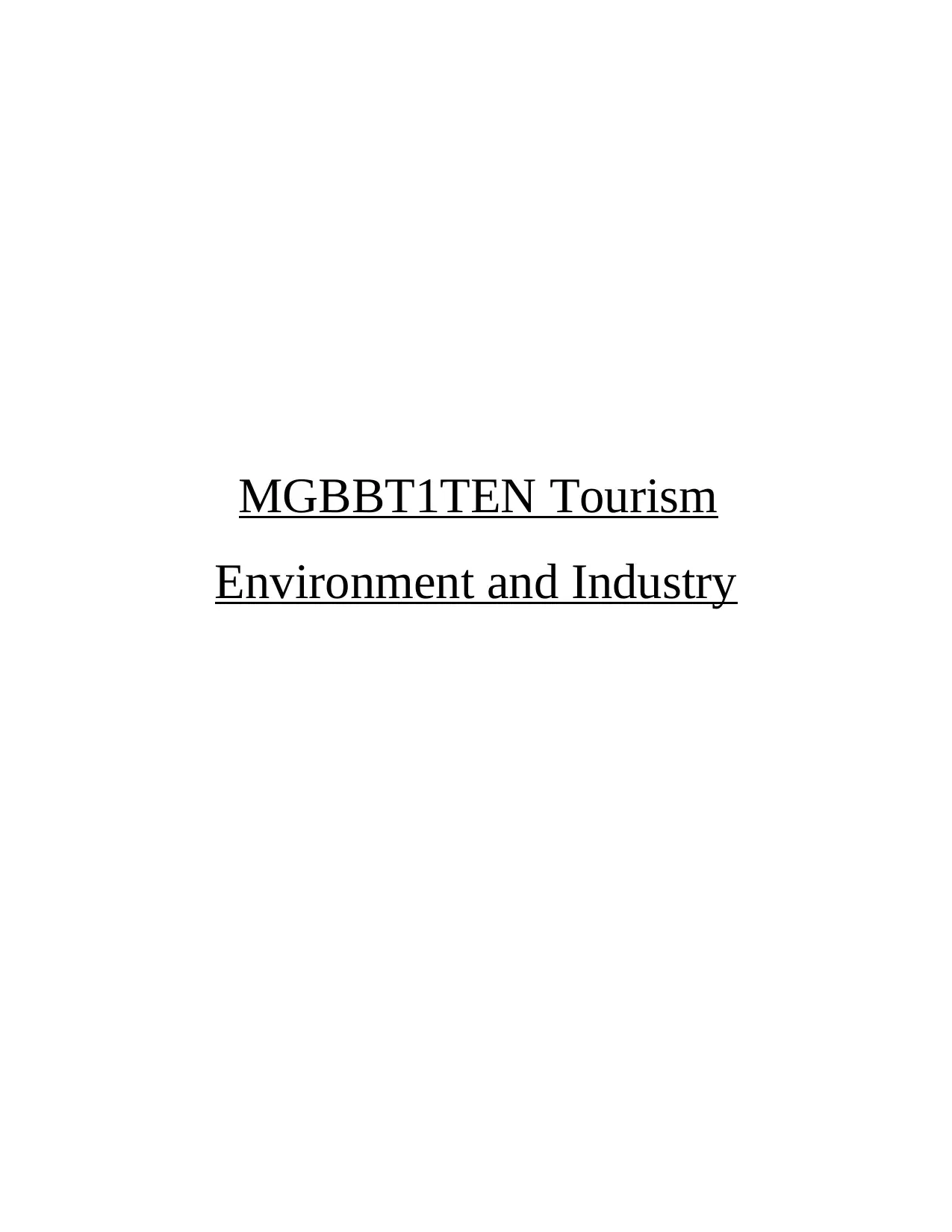
MGBBT1TEN Tourism
Environment and Industry
Environment and Industry
Paraphrase This Document
Need a fresh take? Get an instant paraphrase of this document with our AI Paraphraser
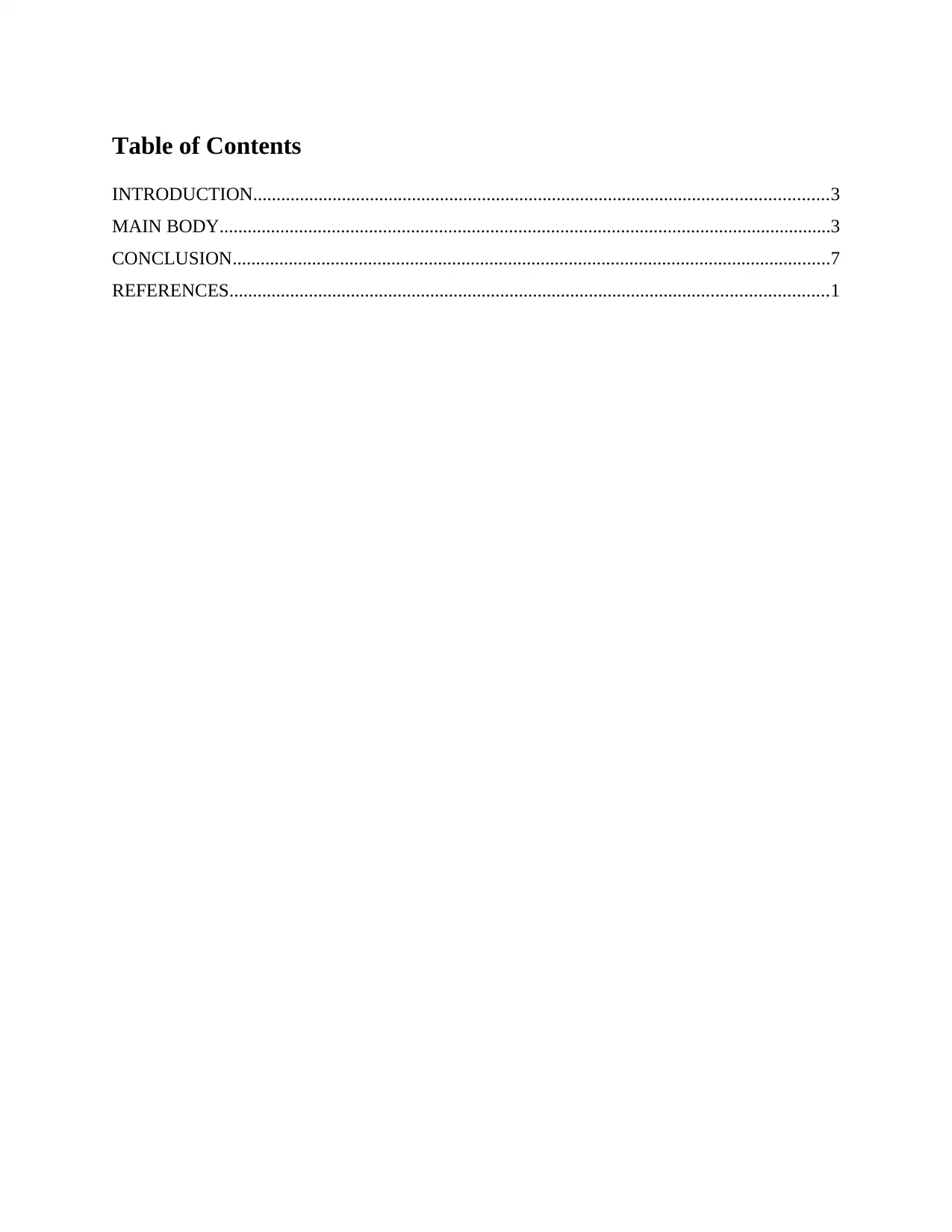
Table of Contents
INTRODUCTION...........................................................................................................................3
MAIN BODY...................................................................................................................................3
CONCLUSION................................................................................................................................7
REFERENCES................................................................................................................................1
INTRODUCTION...........................................................................................................................3
MAIN BODY...................................................................................................................................3
CONCLUSION................................................................................................................................7
REFERENCES................................................................................................................................1
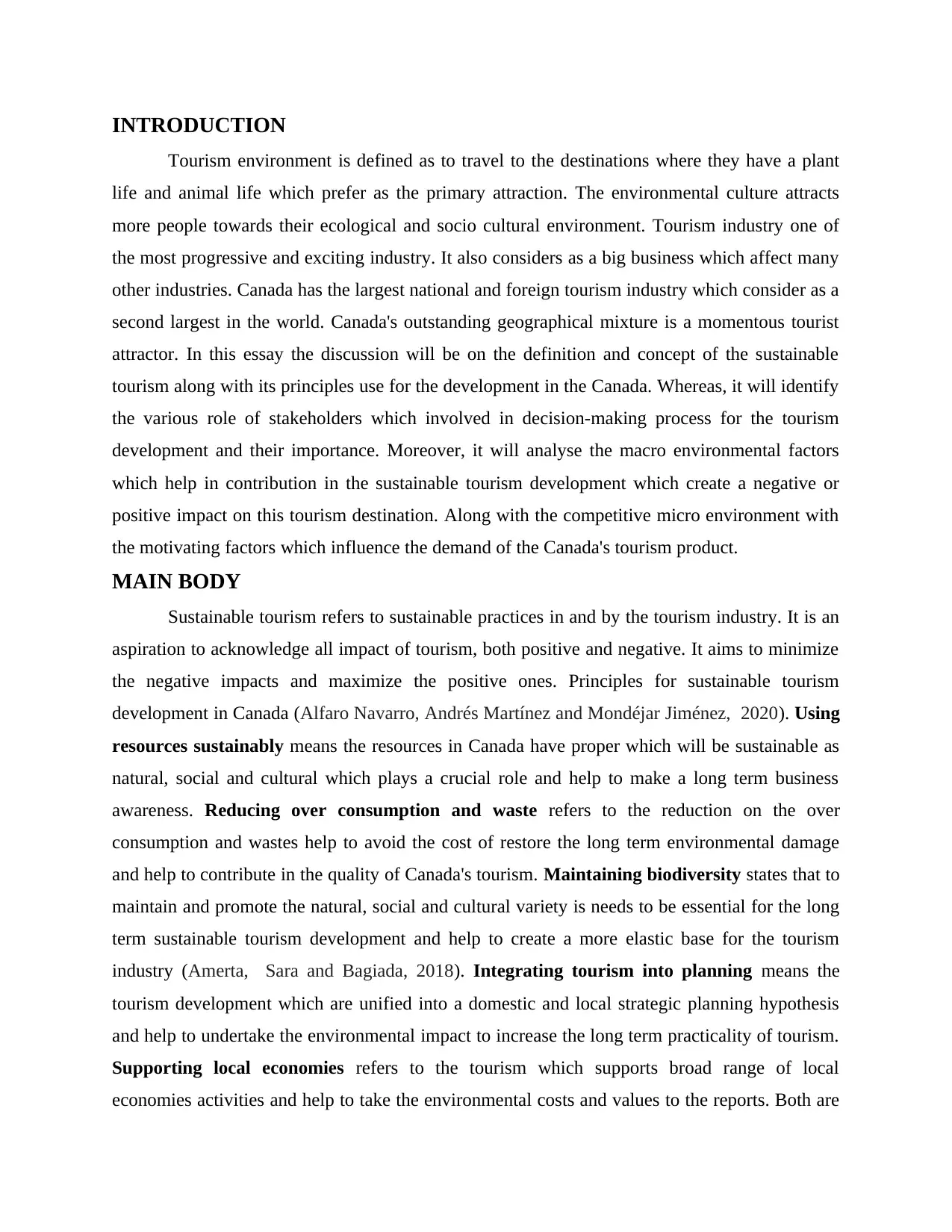
INTRODUCTION
Tourism environment is defined as to travel to the destinations where they have a plant
life and animal life which prefer as the primary attraction. The environmental culture attracts
more people towards their ecological and socio cultural environment. Tourism industry one of
the most progressive and exciting industry. It also considers as a big business which affect many
other industries. Canada has the largest national and foreign tourism industry which consider as a
second largest in the world. Canada's outstanding geographical mixture is a momentous tourist
attractor. In this essay the discussion will be on the definition and concept of the sustainable
tourism along with its principles use for the development in the Canada. Whereas, it will identify
the various role of stakeholders which involved in decision-making process for the tourism
development and their importance. Moreover, it will analyse the macro environmental factors
which help in contribution in the sustainable tourism development which create a negative or
positive impact on this tourism destination. Along with the competitive micro environment with
the motivating factors which influence the demand of the Canada's tourism product.
MAIN BODY
Sustainable tourism refers to sustainable practices in and by the tourism industry. It is an
aspiration to acknowledge all impact of tourism, both positive and negative. It aims to minimize
the negative impacts and maximize the positive ones. Principles for sustainable tourism
development in Canada (Alfaro Navarro, Andrés Martínez and Mondéjar Jiménez, 2020). Using
resources sustainably means the resources in Canada have proper which will be sustainable as
natural, social and cultural which plays a crucial role and help to make a long term business
awareness. Reducing over consumption and waste refers to the reduction on the over
consumption and wastes help to avoid the cost of restore the long term environmental damage
and help to contribute in the quality of Canada's tourism. Maintaining biodiversity states that to
maintain and promote the natural, social and cultural variety is needs to be essential for the long
term sustainable tourism development and help to create a more elastic base for the tourism
industry (Amerta, Sara and Bagiada, 2018). Integrating tourism into planning means the
tourism development which are unified into a domestic and local strategic planning hypothesis
and help to undertake the environmental impact to increase the long term practicality of tourism.
Supporting local economies refers to the tourism which supports broad range of local
economies activities and help to take the environmental costs and values to the reports. Both are
Tourism environment is defined as to travel to the destinations where they have a plant
life and animal life which prefer as the primary attraction. The environmental culture attracts
more people towards their ecological and socio cultural environment. Tourism industry one of
the most progressive and exciting industry. It also considers as a big business which affect many
other industries. Canada has the largest national and foreign tourism industry which consider as a
second largest in the world. Canada's outstanding geographical mixture is a momentous tourist
attractor. In this essay the discussion will be on the definition and concept of the sustainable
tourism along with its principles use for the development in the Canada. Whereas, it will identify
the various role of stakeholders which involved in decision-making process for the tourism
development and their importance. Moreover, it will analyse the macro environmental factors
which help in contribution in the sustainable tourism development which create a negative or
positive impact on this tourism destination. Along with the competitive micro environment with
the motivating factors which influence the demand of the Canada's tourism product.
MAIN BODY
Sustainable tourism refers to sustainable practices in and by the tourism industry. It is an
aspiration to acknowledge all impact of tourism, both positive and negative. It aims to minimize
the negative impacts and maximize the positive ones. Principles for sustainable tourism
development in Canada (Alfaro Navarro, Andrés Martínez and Mondéjar Jiménez, 2020). Using
resources sustainably means the resources in Canada have proper which will be sustainable as
natural, social and cultural which plays a crucial role and help to make a long term business
awareness. Reducing over consumption and waste refers to the reduction on the over
consumption and wastes help to avoid the cost of restore the long term environmental damage
and help to contribute in the quality of Canada's tourism. Maintaining biodiversity states that to
maintain and promote the natural, social and cultural variety is needs to be essential for the long
term sustainable tourism development and help to create a more elastic base for the tourism
industry (Amerta, Sara and Bagiada, 2018). Integrating tourism into planning means the
tourism development which are unified into a domestic and local strategic planning hypothesis
and help to undertake the environmental impact to increase the long term practicality of tourism.
Supporting local economies refers to the tourism which supports broad range of local
economies activities and help to take the environmental costs and values to the reports. Both are
⊘ This is a preview!⊘
Do you want full access?
Subscribe today to unlock all pages.

Trusted by 1+ million students worldwide
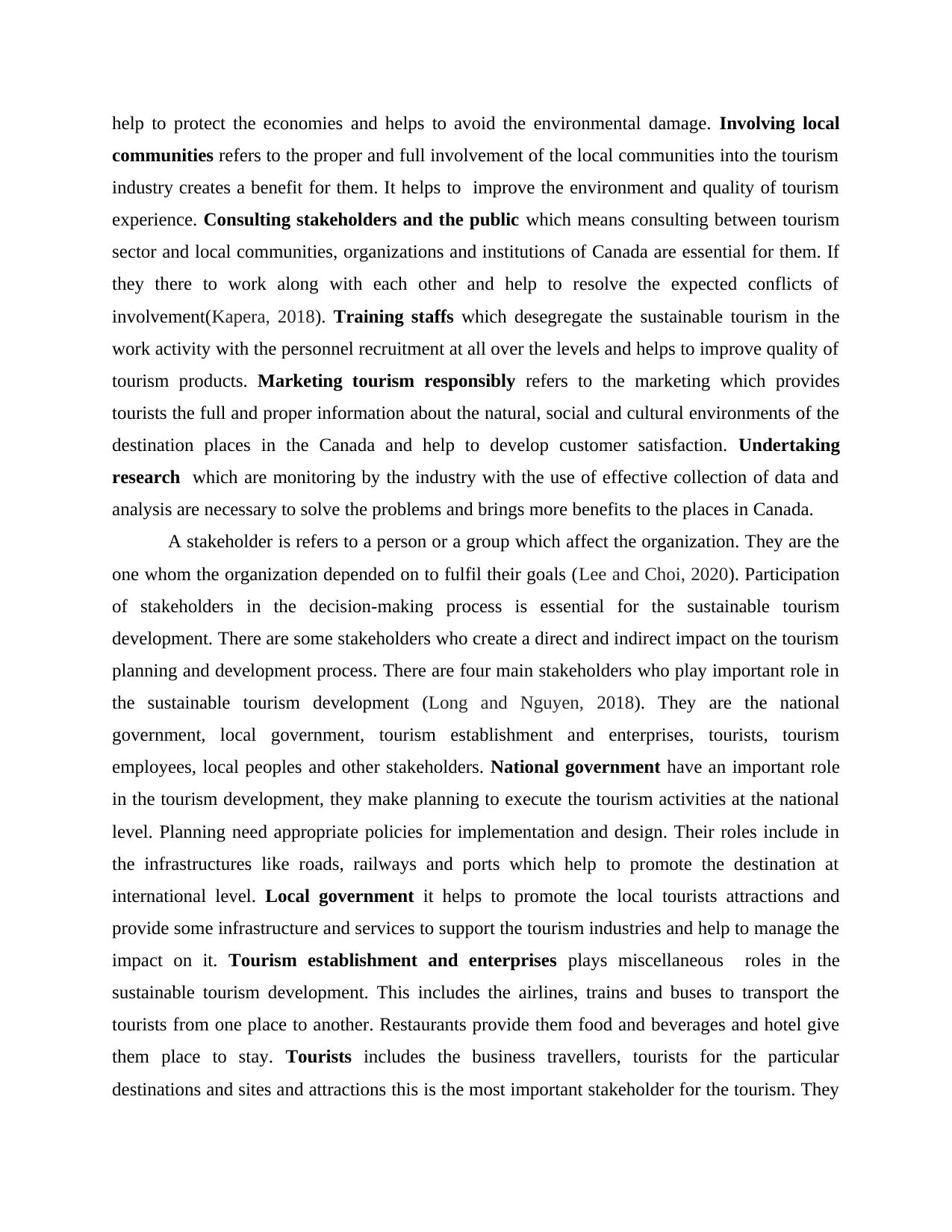
help to protect the economies and helps to avoid the environmental damage. Involving local
communities refers to the proper and full involvement of the local communities into the tourism
industry creates a benefit for them. It helps to improve the environment and quality of tourism
experience. Consulting stakeholders and the public which means consulting between tourism
sector and local communities, organizations and institutions of Canada are essential for them. If
they there to work along with each other and help to resolve the expected conflicts of
involvement(Kapera, 2018). Training staffs which desegregate the sustainable tourism in the
work activity with the personnel recruitment at all over the levels and helps to improve quality of
tourism products. Marketing tourism responsibly refers to the marketing which provides
tourists the full and proper information about the natural, social and cultural environments of the
destination places in the Canada and help to develop customer satisfaction. Undertaking
research which are monitoring by the industry with the use of effective collection of data and
analysis are necessary to solve the problems and brings more benefits to the places in Canada.
A stakeholder is refers to a person or a group which affect the organization. They are the
one whom the organization depended on to fulfil their goals (Lee and Choi, 2020). Participation
of stakeholders in the decision-making process is essential for the sustainable tourism
development. There are some stakeholders who create a direct and indirect impact on the tourism
planning and development process. There are four main stakeholders who play important role in
the sustainable tourism development (Long and Nguyen, 2018). They are the national
government, local government, tourism establishment and enterprises, tourists, tourism
employees, local peoples and other stakeholders. National government have an important role
in the tourism development, they make planning to execute the tourism activities at the national
level. Planning need appropriate policies for implementation and design. Their roles include in
the infrastructures like roads, railways and ports which help to promote the destination at
international level. Local government it helps to promote the local tourists attractions and
provide some infrastructure and services to support the tourism industries and help to manage the
impact on it. Tourism establishment and enterprises plays miscellaneous roles in the
sustainable tourism development. This includes the airlines, trains and buses to transport the
tourists from one place to another. Restaurants provide them food and beverages and hotel give
them place to stay. Tourists includes the business travellers, tourists for the particular
destinations and sites and attractions this is the most important stakeholder for the tourism. They
communities refers to the proper and full involvement of the local communities into the tourism
industry creates a benefit for them. It helps to improve the environment and quality of tourism
experience. Consulting stakeholders and the public which means consulting between tourism
sector and local communities, organizations and institutions of Canada are essential for them. If
they there to work along with each other and help to resolve the expected conflicts of
involvement(Kapera, 2018). Training staffs which desegregate the sustainable tourism in the
work activity with the personnel recruitment at all over the levels and helps to improve quality of
tourism products. Marketing tourism responsibly refers to the marketing which provides
tourists the full and proper information about the natural, social and cultural environments of the
destination places in the Canada and help to develop customer satisfaction. Undertaking
research which are monitoring by the industry with the use of effective collection of data and
analysis are necessary to solve the problems and brings more benefits to the places in Canada.
A stakeholder is refers to a person or a group which affect the organization. They are the
one whom the organization depended on to fulfil their goals (Lee and Choi, 2020). Participation
of stakeholders in the decision-making process is essential for the sustainable tourism
development. There are some stakeholders who create a direct and indirect impact on the tourism
planning and development process. There are four main stakeholders who play important role in
the sustainable tourism development (Long and Nguyen, 2018). They are the national
government, local government, tourism establishment and enterprises, tourists, tourism
employees, local peoples and other stakeholders. National government have an important role
in the tourism development, they make planning to execute the tourism activities at the national
level. Planning need appropriate policies for implementation and design. Their roles include in
the infrastructures like roads, railways and ports which help to promote the destination at
international level. Local government it helps to promote the local tourists attractions and
provide some infrastructure and services to support the tourism industries and help to manage the
impact on it. Tourism establishment and enterprises plays miscellaneous roles in the
sustainable tourism development. This includes the airlines, trains and buses to transport the
tourists from one place to another. Restaurants provide them food and beverages and hotel give
them place to stay. Tourists includes the business travellers, tourists for the particular
destinations and sites and attractions this is the most important stakeholder for the tourism. They
Paraphrase This Document
Need a fresh take? Get an instant paraphrase of this document with our AI Paraphraser
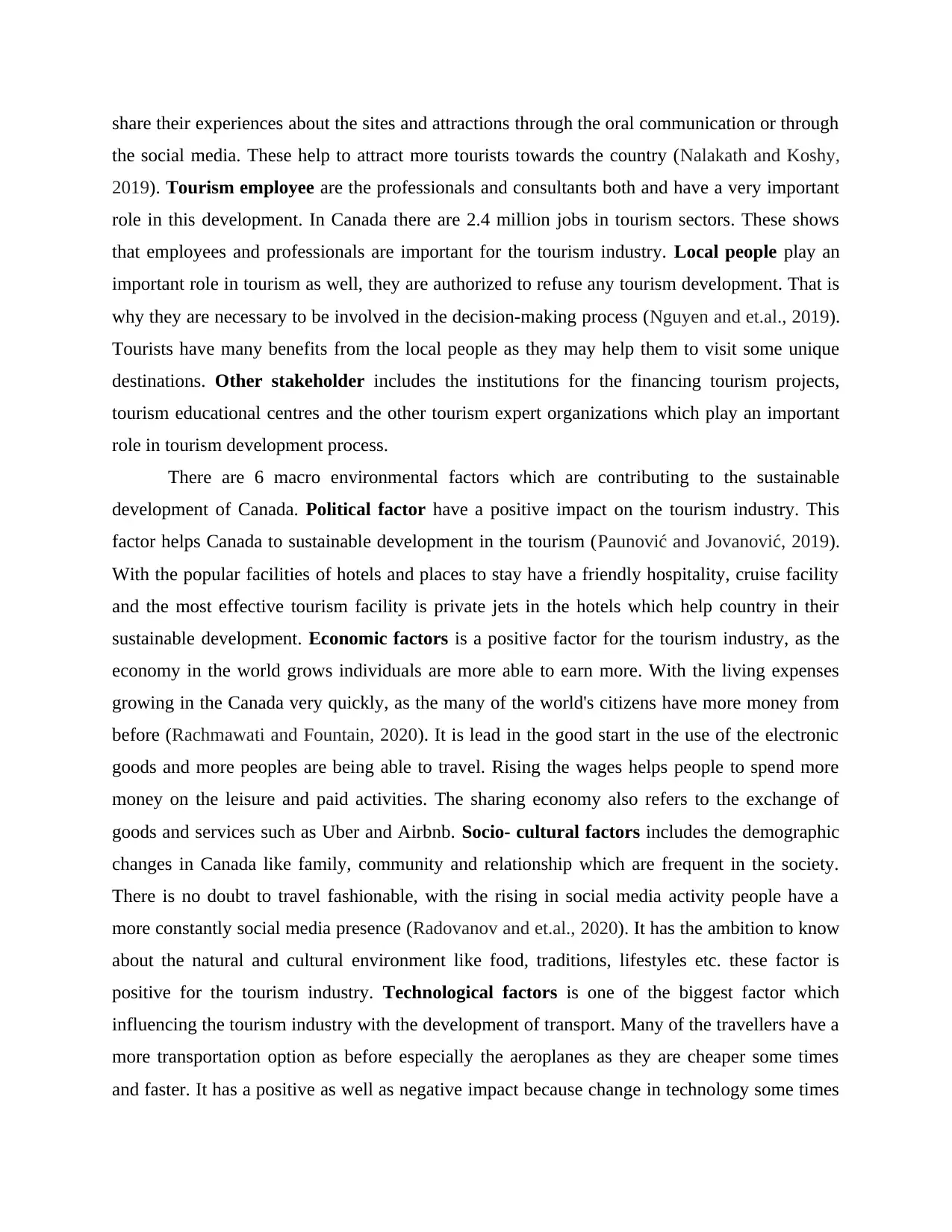
share their experiences about the sites and attractions through the oral communication or through
the social media. These help to attract more tourists towards the country (Nalakath and Koshy,
2019). Tourism employee are the professionals and consultants both and have a very important
role in this development. In Canada there are 2.4 million jobs in tourism sectors. These shows
that employees and professionals are important for the tourism industry. Local people play an
important role in tourism as well, they are authorized to refuse any tourism development. That is
why they are necessary to be involved in the decision-making process (Nguyen and et.al., 2019).
Tourists have many benefits from the local people as they may help them to visit some unique
destinations. Other stakeholder includes the institutions for the financing tourism projects,
tourism educational centres and the other tourism expert organizations which play an important
role in tourism development process.
There are 6 macro environmental factors which are contributing to the sustainable
development of Canada. Political factor have a positive impact on the tourism industry. This
factor helps Canada to sustainable development in the tourism (Paunović and Jovanović, 2019).
With the popular facilities of hotels and places to stay have a friendly hospitality, cruise facility
and the most effective tourism facility is private jets in the hotels which help country in their
sustainable development. Economic factors is a positive factor for the tourism industry, as the
economy in the world grows individuals are more able to earn more. With the living expenses
growing in the Canada very quickly, as the many of the world's citizens have more money from
before (Rachmawati and Fountain, 2020). It is lead in the good start in the use of the electronic
goods and more peoples are being able to travel. Rising the wages helps people to spend more
money on the leisure and paid activities. The sharing economy also refers to the exchange of
goods and services such as Uber and Airbnb. Socio- cultural factors includes the demographic
changes in Canada like family, community and relationship which are frequent in the society.
There is no doubt to travel fashionable, with the rising in social media activity people have a
more constantly social media presence (Radovanov and et.al., 2020). It has the ambition to know
about the natural and cultural environment like food, traditions, lifestyles etc. these factor is
positive for the tourism industry. Technological factors is one of the biggest factor which
influencing the tourism industry with the development of transport. Many of the travellers have a
more transportation option as before especially the aeroplanes as they are cheaper some times
and faster. It has a positive as well as negative impact because change in technology some times
the social media. These help to attract more tourists towards the country (Nalakath and Koshy,
2019). Tourism employee are the professionals and consultants both and have a very important
role in this development. In Canada there are 2.4 million jobs in tourism sectors. These shows
that employees and professionals are important for the tourism industry. Local people play an
important role in tourism as well, they are authorized to refuse any tourism development. That is
why they are necessary to be involved in the decision-making process (Nguyen and et.al., 2019).
Tourists have many benefits from the local people as they may help them to visit some unique
destinations. Other stakeholder includes the institutions for the financing tourism projects,
tourism educational centres and the other tourism expert organizations which play an important
role in tourism development process.
There are 6 macro environmental factors which are contributing to the sustainable
development of Canada. Political factor have a positive impact on the tourism industry. This
factor helps Canada to sustainable development in the tourism (Paunović and Jovanović, 2019).
With the popular facilities of hotels and places to stay have a friendly hospitality, cruise facility
and the most effective tourism facility is private jets in the hotels which help country in their
sustainable development. Economic factors is a positive factor for the tourism industry, as the
economy in the world grows individuals are more able to earn more. With the living expenses
growing in the Canada very quickly, as the many of the world's citizens have more money from
before (Rachmawati and Fountain, 2020). It is lead in the good start in the use of the electronic
goods and more peoples are being able to travel. Rising the wages helps people to spend more
money on the leisure and paid activities. The sharing economy also refers to the exchange of
goods and services such as Uber and Airbnb. Socio- cultural factors includes the demographic
changes in Canada like family, community and relationship which are frequent in the society.
There is no doubt to travel fashionable, with the rising in social media activity people have a
more constantly social media presence (Radovanov and et.al., 2020). It has the ambition to know
about the natural and cultural environment like food, traditions, lifestyles etc. these factor is
positive for the tourism industry. Technological factors is one of the biggest factor which
influencing the tourism industry with the development of transport. Many of the travellers have a
more transportation option as before especially the aeroplanes as they are cheaper some times
and faster. It has a positive as well as negative impact because change in technology some times
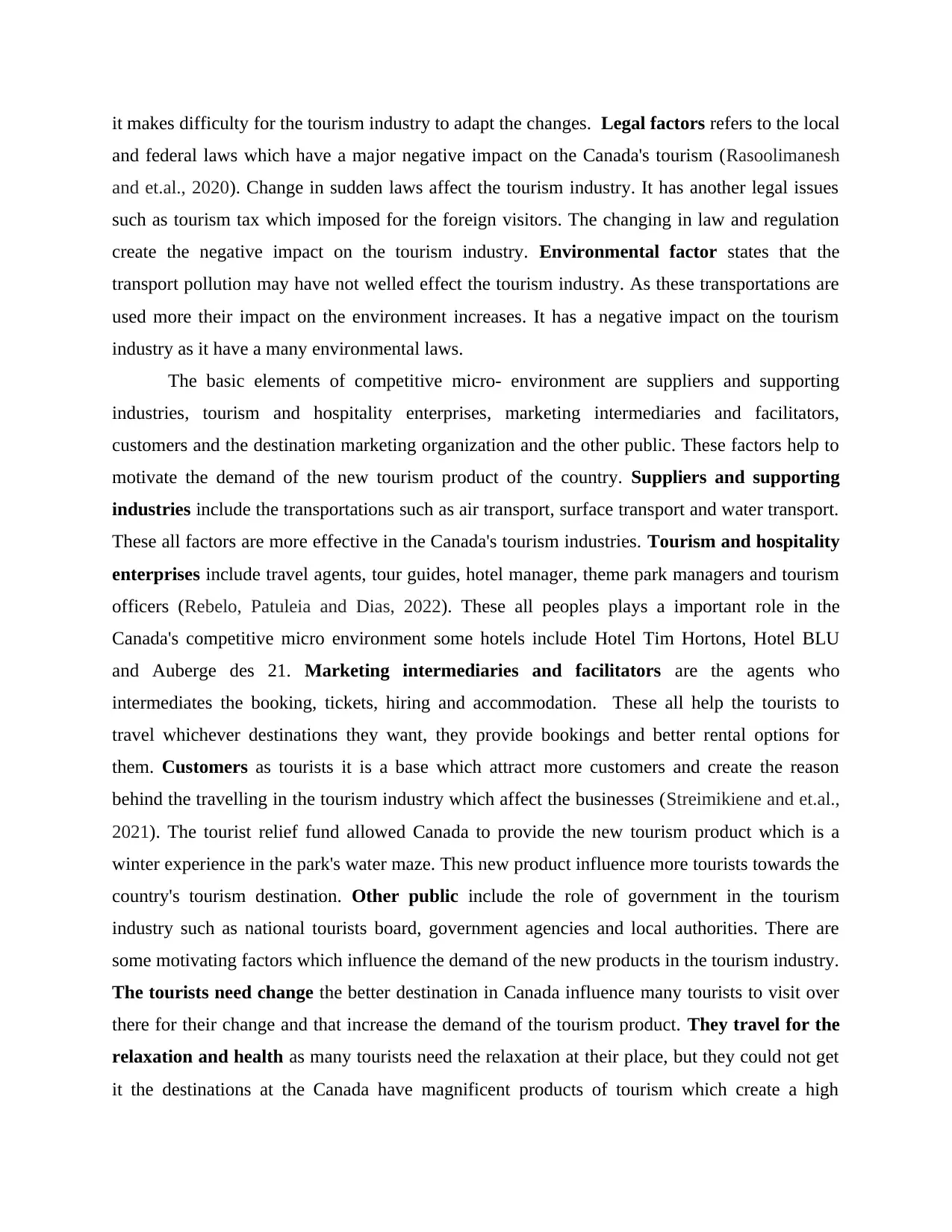
it makes difficulty for the tourism industry to adapt the changes. Legal factors refers to the local
and federal laws which have a major negative impact on the Canada's tourism (Rasoolimanesh
and et.al., 2020). Change in sudden laws affect the tourism industry. It has another legal issues
such as tourism tax which imposed for the foreign visitors. The changing in law and regulation
create the negative impact on the tourism industry. Environmental factor states that the
transport pollution may have not welled effect the tourism industry. As these transportations are
used more their impact on the environment increases. It has a negative impact on the tourism
industry as it have a many environmental laws.
The basic elements of competitive micro- environment are suppliers and supporting
industries, tourism and hospitality enterprises, marketing intermediaries and facilitators,
customers and the destination marketing organization and the other public. These factors help to
motivate the demand of the new tourism product of the country. Suppliers and supporting
industries include the transportations such as air transport, surface transport and water transport.
These all factors are more effective in the Canada's tourism industries. Tourism and hospitality
enterprises include travel agents, tour guides, hotel manager, theme park managers and tourism
officers (Rebelo, Patuleia and Dias, 2022). These all peoples plays a important role in the
Canada's competitive micro environment some hotels include Hotel Tim Hortons, Hotel BLU
and Auberge des 21. Marketing intermediaries and facilitators are the agents who
intermediates the booking, tickets, hiring and accommodation. These all help the tourists to
travel whichever destinations they want, they provide bookings and better rental options for
them. Customers as tourists it is a base which attract more customers and create the reason
behind the travelling in the tourism industry which affect the businesses (Streimikiene and et.al.,
2021). The tourist relief fund allowed Canada to provide the new tourism product which is a
winter experience in the park's water maze. This new product influence more tourists towards the
country's tourism destination. Other public include the role of government in the tourism
industry such as national tourists board, government agencies and local authorities. There are
some motivating factors which influence the demand of the new products in the tourism industry.
The tourists need change the better destination in Canada influence many tourists to visit over
there for their change and that increase the demand of the tourism product. They travel for the
relaxation and health as many tourists need the relaxation at their place, but they could not get
it the destinations at the Canada have magnificent products of tourism which create a high
and federal laws which have a major negative impact on the Canada's tourism (Rasoolimanesh
and et.al., 2020). Change in sudden laws affect the tourism industry. It has another legal issues
such as tourism tax which imposed for the foreign visitors. The changing in law and regulation
create the negative impact on the tourism industry. Environmental factor states that the
transport pollution may have not welled effect the tourism industry. As these transportations are
used more their impact on the environment increases. It has a negative impact on the tourism
industry as it have a many environmental laws.
The basic elements of competitive micro- environment are suppliers and supporting
industries, tourism and hospitality enterprises, marketing intermediaries and facilitators,
customers and the destination marketing organization and the other public. These factors help to
motivate the demand of the new tourism product of the country. Suppliers and supporting
industries include the transportations such as air transport, surface transport and water transport.
These all factors are more effective in the Canada's tourism industries. Tourism and hospitality
enterprises include travel agents, tour guides, hotel manager, theme park managers and tourism
officers (Rebelo, Patuleia and Dias, 2022). These all peoples plays a important role in the
Canada's competitive micro environment some hotels include Hotel Tim Hortons, Hotel BLU
and Auberge des 21. Marketing intermediaries and facilitators are the agents who
intermediates the booking, tickets, hiring and accommodation. These all help the tourists to
travel whichever destinations they want, they provide bookings and better rental options for
them. Customers as tourists it is a base which attract more customers and create the reason
behind the travelling in the tourism industry which affect the businesses (Streimikiene and et.al.,
2021). The tourist relief fund allowed Canada to provide the new tourism product which is a
winter experience in the park's water maze. This new product influence more tourists towards the
country's tourism destination. Other public include the role of government in the tourism
industry such as national tourists board, government agencies and local authorities. There are
some motivating factors which influence the demand of the new products in the tourism industry.
The tourists need change the better destination in Canada influence many tourists to visit over
there for their change and that increase the demand of the tourism product. They travel for the
relaxation and health as many tourists need the relaxation at their place, but they could not get
it the destinations at the Canada have magnificent products of tourism which create a high
⊘ This is a preview!⊘
Do you want full access?
Subscribe today to unlock all pages.

Trusted by 1+ million students worldwide
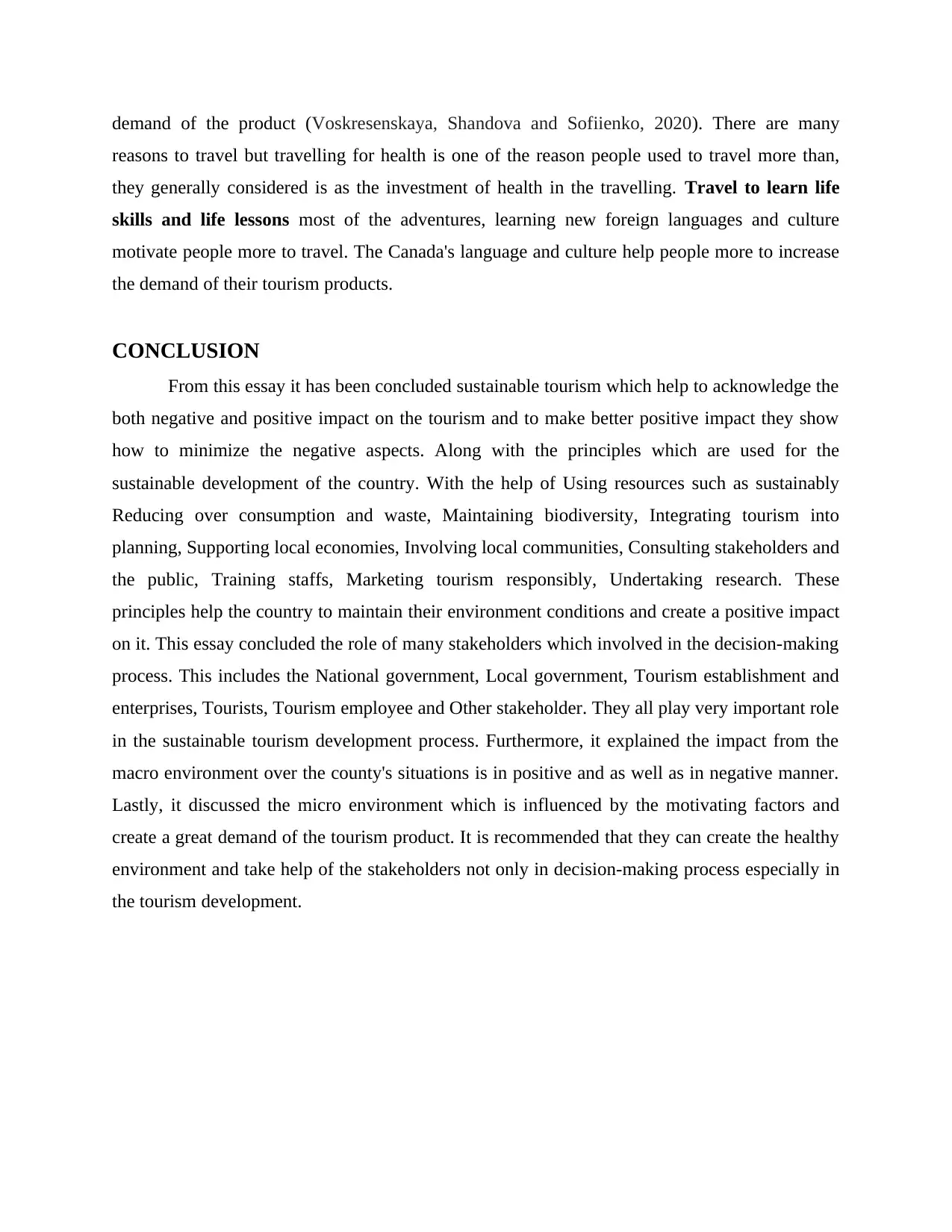
demand of the product (Voskresenskaya, Shandova and Sofiienko, 2020). There are many
reasons to travel but travelling for health is one of the reason people used to travel more than,
they generally considered is as the investment of health in the travelling. Travel to learn life
skills and life lessons most of the adventures, learning new foreign languages and culture
motivate people more to travel. The Canada's language and culture help people more to increase
the demand of their tourism products.
CONCLUSION
From this essay it has been concluded sustainable tourism which help to acknowledge the
both negative and positive impact on the tourism and to make better positive impact they show
how to minimize the negative aspects. Along with the principles which are used for the
sustainable development of the country. With the help of Using resources such as sustainably
Reducing over consumption and waste, Maintaining biodiversity, Integrating tourism into
planning, Supporting local economies, Involving local communities, Consulting stakeholders and
the public, Training staffs, Marketing tourism responsibly, Undertaking research. These
principles help the country to maintain their environment conditions and create a positive impact
on it. This essay concluded the role of many stakeholders which involved in the decision-making
process. This includes the National government, Local government, Tourism establishment and
enterprises, Tourists, Tourism employee and Other stakeholder. They all play very important role
in the sustainable tourism development process. Furthermore, it explained the impact from the
macro environment over the county's situations is in positive and as well as in negative manner.
Lastly, it discussed the micro environment which is influenced by the motivating factors and
create a great demand of the tourism product. It is recommended that they can create the healthy
environment and take help of the stakeholders not only in decision-making process especially in
the tourism development.
reasons to travel but travelling for health is one of the reason people used to travel more than,
they generally considered is as the investment of health in the travelling. Travel to learn life
skills and life lessons most of the adventures, learning new foreign languages and culture
motivate people more to travel. The Canada's language and culture help people more to increase
the demand of their tourism products.
CONCLUSION
From this essay it has been concluded sustainable tourism which help to acknowledge the
both negative and positive impact on the tourism and to make better positive impact they show
how to minimize the negative aspects. Along with the principles which are used for the
sustainable development of the country. With the help of Using resources such as sustainably
Reducing over consumption and waste, Maintaining biodiversity, Integrating tourism into
planning, Supporting local economies, Involving local communities, Consulting stakeholders and
the public, Training staffs, Marketing tourism responsibly, Undertaking research. These
principles help the country to maintain their environment conditions and create a positive impact
on it. This essay concluded the role of many stakeholders which involved in the decision-making
process. This includes the National government, Local government, Tourism establishment and
enterprises, Tourists, Tourism employee and Other stakeholder. They all play very important role
in the sustainable tourism development process. Furthermore, it explained the impact from the
macro environment over the county's situations is in positive and as well as in negative manner.
Lastly, it discussed the micro environment which is influenced by the motivating factors and
create a great demand of the tourism product. It is recommended that they can create the healthy
environment and take help of the stakeholders not only in decision-making process especially in
the tourism development.
Paraphrase This Document
Need a fresh take? Get an instant paraphrase of this document with our AI Paraphraser

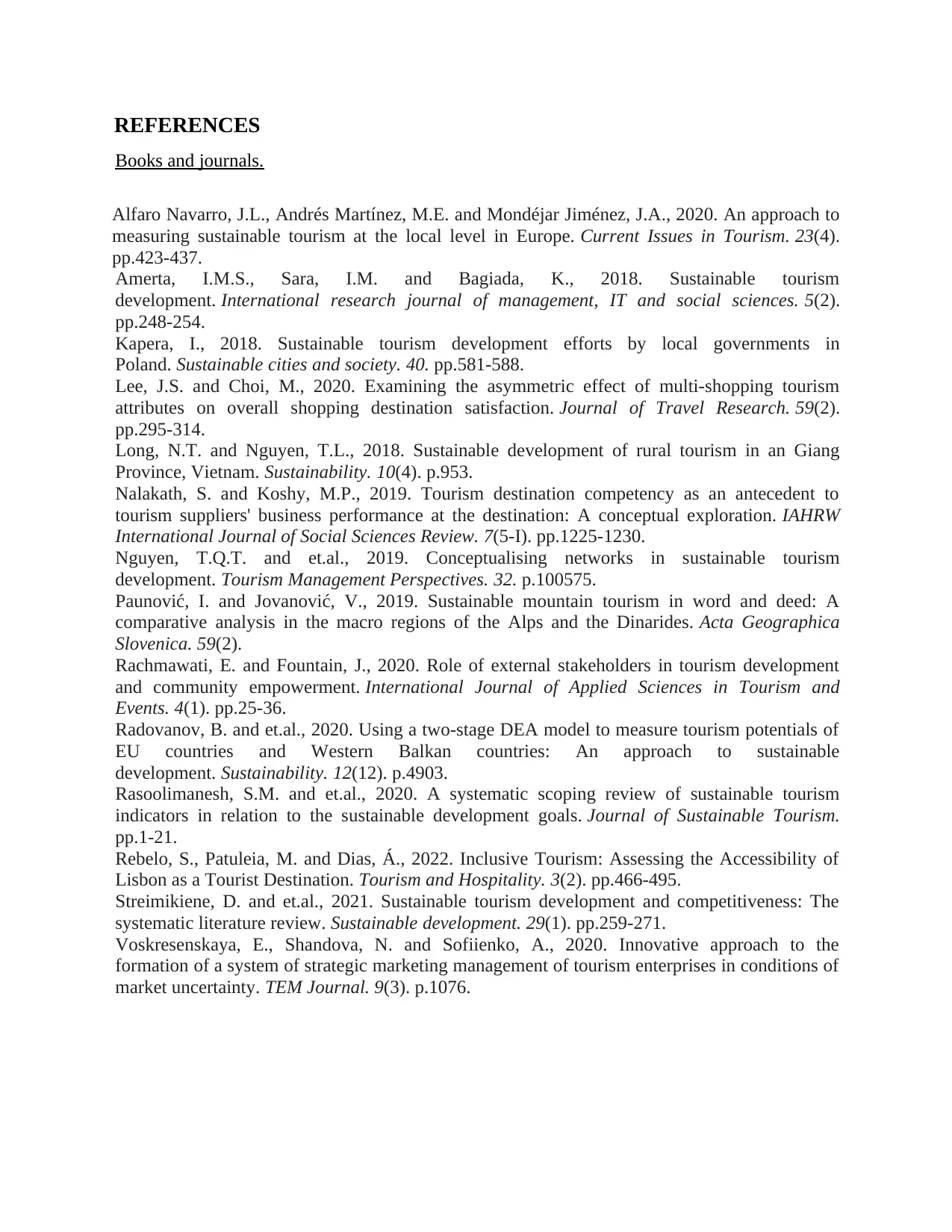
REFERENCES
Books and journals.
Alfaro Navarro, J.L., Andrés Martínez, M.E. and Mondéjar Jiménez, J.A., 2020. An approach to
measuring sustainable tourism at the local level in Europe. Current Issues in Tourism. 23(4).
pp.423-437.
Amerta, I.M.S., Sara, I.M. and Bagiada, K., 2018. Sustainable tourism
development. International research journal of management, IT and social sciences. 5(2).
pp.248-254.
Kapera, I., 2018. Sustainable tourism development efforts by local governments in
Poland. Sustainable cities and society. 40. pp.581-588.
Lee, J.S. and Choi, M., 2020. Examining the asymmetric effect of multi-shopping tourism
attributes on overall shopping destination satisfaction. Journal of Travel Research. 59(2).
pp.295-314.
Long, N.T. and Nguyen, T.L., 2018. Sustainable development of rural tourism in an Giang
Province, Vietnam. Sustainability. 10(4). p.953.
Nalakath, S. and Koshy, M.P., 2019. Tourism destination competency as an antecedent to
tourism suppliers' business performance at the destination: A conceptual exploration. IAHRW
International Journal of Social Sciences Review. 7(5-I). pp.1225-1230.
Nguyen, T.Q.T. and et.al., 2019. Conceptualising networks in sustainable tourism
development. Tourism Management Perspectives. 32. p.100575.
Paunović, I. and Jovanović, V., 2019. Sustainable mountain tourism in word and deed: A
comparative analysis in the macro regions of the Alps and the Dinarides. Acta Geographica
Slovenica. 59(2).
Rachmawati, E. and Fountain, J., 2020. Role of external stakeholders in tourism development
and community empowerment. International Journal of Applied Sciences in Tourism and
Events. 4(1). pp.25-36.
Radovanov, B. and et.al., 2020. Using a two-stage DEA model to measure tourism potentials of
EU countries and Western Balkan countries: An approach to sustainable
development. Sustainability. 12(12). p.4903.
Rasoolimanesh, S.M. and et.al., 2020. A systematic scoping review of sustainable tourism
indicators in relation to the sustainable development goals. Journal of Sustainable Tourism.
pp.1-21.
Rebelo, S., Patuleia, M. and Dias, Á., 2022. Inclusive Tourism: Assessing the Accessibility of
Lisbon as a Tourist Destination. Tourism and Hospitality. 3(2). pp.466-495.
Streimikiene, D. and et.al., 2021. Sustainable tourism development and competitiveness: The
systematic literature review. Sustainable development. 29(1). pp.259-271.
Voskresenskaya, E., Shandova, N. and Sofiienko, A., 2020. Innovative approach to the
formation of a system of strategic marketing management of tourism enterprises in conditions of
market uncertainty. TEM Journal. 9(3). p.1076.
Books and journals.
Alfaro Navarro, J.L., Andrés Martínez, M.E. and Mondéjar Jiménez, J.A., 2020. An approach to
measuring sustainable tourism at the local level in Europe. Current Issues in Tourism. 23(4).
pp.423-437.
Amerta, I.M.S., Sara, I.M. and Bagiada, K., 2018. Sustainable tourism
development. International research journal of management, IT and social sciences. 5(2).
pp.248-254.
Kapera, I., 2018. Sustainable tourism development efforts by local governments in
Poland. Sustainable cities and society. 40. pp.581-588.
Lee, J.S. and Choi, M., 2020. Examining the asymmetric effect of multi-shopping tourism
attributes on overall shopping destination satisfaction. Journal of Travel Research. 59(2).
pp.295-314.
Long, N.T. and Nguyen, T.L., 2018. Sustainable development of rural tourism in an Giang
Province, Vietnam. Sustainability. 10(4). p.953.
Nalakath, S. and Koshy, M.P., 2019. Tourism destination competency as an antecedent to
tourism suppliers' business performance at the destination: A conceptual exploration. IAHRW
International Journal of Social Sciences Review. 7(5-I). pp.1225-1230.
Nguyen, T.Q.T. and et.al., 2019. Conceptualising networks in sustainable tourism
development. Tourism Management Perspectives. 32. p.100575.
Paunović, I. and Jovanović, V., 2019. Sustainable mountain tourism in word and deed: A
comparative analysis in the macro regions of the Alps and the Dinarides. Acta Geographica
Slovenica. 59(2).
Rachmawati, E. and Fountain, J., 2020. Role of external stakeholders in tourism development
and community empowerment. International Journal of Applied Sciences in Tourism and
Events. 4(1). pp.25-36.
Radovanov, B. and et.al., 2020. Using a two-stage DEA model to measure tourism potentials of
EU countries and Western Balkan countries: An approach to sustainable
development. Sustainability. 12(12). p.4903.
Rasoolimanesh, S.M. and et.al., 2020. A systematic scoping review of sustainable tourism
indicators in relation to the sustainable development goals. Journal of Sustainable Tourism.
pp.1-21.
Rebelo, S., Patuleia, M. and Dias, Á., 2022. Inclusive Tourism: Assessing the Accessibility of
Lisbon as a Tourist Destination. Tourism and Hospitality. 3(2). pp.466-495.
Streimikiene, D. and et.al., 2021. Sustainable tourism development and competitiveness: The
systematic literature review. Sustainable development. 29(1). pp.259-271.
Voskresenskaya, E., Shandova, N. and Sofiienko, A., 2020. Innovative approach to the
formation of a system of strategic marketing management of tourism enterprises in conditions of
market uncertainty. TEM Journal. 9(3). p.1076.
⊘ This is a preview!⊘
Do you want full access?
Subscribe today to unlock all pages.

Trusted by 1+ million students worldwide

Online
Paraphrase This Document
Need a fresh take? Get an instant paraphrase of this document with our AI Paraphraser

3
1 out of 11
Related Documents
Your All-in-One AI-Powered Toolkit for Academic Success.
+13062052269
info@desklib.com
Available 24*7 on WhatsApp / Email
![[object Object]](/_next/static/media/star-bottom.7253800d.svg)
Unlock your academic potential
Copyright © 2020–2026 A2Z Services. All Rights Reserved. Developed and managed by ZUCOL.




